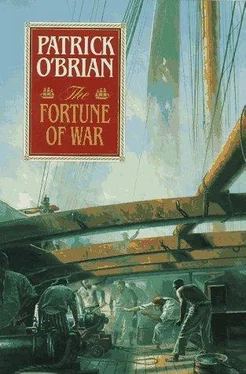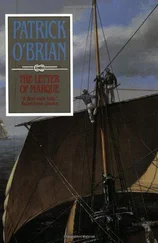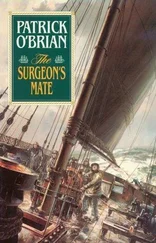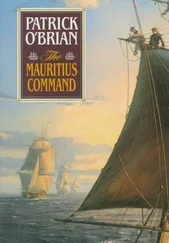Patrick O'Brian - The fortune of war
Здесь есть возможность читать онлайн «Patrick O'Brian - The fortune of war» весь текст электронной книги совершенно бесплатно (целиком полную версию без сокращений). В некоторых случаях можно слушать аудио, скачать через торрент в формате fb2 и присутствует краткое содержание. Жанр: Книги. Описание произведения, (предисловие) а так же отзывы посетителей доступны на портале библиотеки ЛибКат.
- Название:The fortune of war
- Автор:
- Жанр:
- Год:неизвестен
- ISBN:нет данных
- Рейтинг книги:3 / 5. Голосов: 1
-
Избранное:Добавить в избранное
- Отзывы:
-
Ваша оценка:
- 60
- 1
- 2
- 3
- 4
- 5
The fortune of war: краткое содержание, описание и аннотация
Предлагаем к чтению аннотацию, описание, краткое содержание или предисловие (зависит от того, что написал сам автор книги «The fortune of war»). Если вы не нашли необходимую информацию о книге — напишите в комментариях, мы постараемся отыскать её.
The fortune of war — читать онлайн бесплатно полную книгу (весь текст) целиком
Ниже представлен текст книги, разбитый по страницам. Система сохранения места последней прочитанной страницы, позволяет с удобством читать онлайн бесплатно книгу «The fortune of war», без необходимости каждый раз заново искать на чём Вы остановились. Поставьте закладку, и сможете в любой момент перейти на страницу, на которой закончили чтение.
Интервал:
Закладка:
'Oh for women at sea to obviate the eternal crosscatharpings,' he said to himself, 'to do away with the grumlinfuttocks, and to inject a little civilization, even of an equivocal nature, even at the risk of moral deviation.'
He was the first of the Leopards to appear, and apart from offering him coffee, tea, mutton chops, bacon, eggs, soused herrings, cold pie, ham, butter, toast and marmalade, and seeing to his comfort, few people spoke to him.
He was obviously still much reduced by his ordeal; he was thought to be deaf; and their surgeon had told them that he was not to be excited - 'He has an ugly livid countenance that argues some damage to the heart.'
The master did ask him what he thought of the President, but he replied, 'A most unfortunate choice, sir. No bottom, weak, easily blown from side to side.'
'Indeed, sir?' cried the master: and several other officers paid close attention.
'He may be a tolerable Hebrew scholar; he may have genteel insinuating manners and a handsome wife; he may overflow with private virtues. But there is the evil corrupting love of power, the consuming lust for office-'
'I was referring to the ship, sir, to the frigate President.'
'Oh, as for the ship, I am not qualified to form any opinion, at all.'
The master turned to his neighbour, who had something to offer on the subject of scantlings, as they were understood in the United States; so, as neither Babbington nor Byron was yet afoot, Stephen escaped the American navy by swallowing his breakfast in a few quick snaps, in spite of his colleague's warning 'not to eat too much - to chew every mouthful forty times', took a couple of pinches of fortifying snuff, returned to the deck, and asked for news of Captain Aubrey. Captain Aubrey too was still asleep; and pleasantly enough the words were uttered in a little above a whisper, in spite of the hullaballoo that filled the ship from stern to stern.
Stephen took a few more turns in the brilliant morning sun, revelling in the luxury of clean linen - of any linen at all. The others on the quarterdeck watched him with discreet curiosity, and he watched the working of the ship: even to his unprofessional eye it seemed a little haphazard. Surely there was more noise, more instruction, more pushing men into place than was usual? Forshaw interrupted his thoughts, a strangely transformed Forshaw, not only in that he was clothed, and clothed in garments far too big for him, but in that he had never a smile: his face looked as though he had been crying, and in a low voice he told Stephen that 'if he were at leisure, Captain Aubrey would be glad to have a word with him'.
'I hope that child has not had bad news,' said Stephen to himself, walking to the cabin. 'Some letter announcing death, sent out and here received. On top of what he has experienced, it might have very ill effects. I shall give him half of a blue pill.'
But the look of grief was not peculiar to young Forshaw; it was plain upon Jack's face too, and even more pronounced, a look of shock and deep unhappiness. Captain Lambert, already straitened for room, had moved the Java's master from his day-cabin for his latest guest, and here Jack sat, wedged between an eighteen-pounder gun and the chart-table, with a pot of coffee on the locker beside him He gave a poor smile as he wished Stephen good morning, asked him how he did, and invited him to share his pot.
'First show me your tongue and let me take your pulse,' said Stephen; and a moment later, 'You have had bad news, brother?'
'Of course I have,' said Jack in a low, vehement tone. 'Surely you have heard?'
'Not I.'
'I will put it in half a dozen words: it don't bear dwelling on,' said Jack, putting down his untasted cup. 'Tom Dacres, in Guerri�, thirty-eight, met the American Constitution, forty-four, brought her to action of course; and was beat. Dismasted, taken, and burnt. Then their sloop Wasp, eighteen, tackled our brig Frolic, of almost exactly the same weight of metal, and took her too. Then United States, forty-four, and our Macedonian, thirty-eight, had a fight off the Azores, and Macedonian struck to the Americans. Two of our frigates and a sloop have struck to the Americans, and not one of theirs to us.'
In his diary that night Stephen wrote, 'I do not believe I have ever seen Jack so moved. If he had heard of Sophie's death he would no doubt have felt an even keener, even crueller emotion; but it would have been a personal grief, whereas this is beyond self, except in so far as he is entirely identified with the Royal Navy- it is, after all, his life. This series of defeats, without a single victory, in the first months of a war, is striking enough, particularly since the frigate is the very type of the fighting ship; but it is of no real consequence. This whole American war and a fortiori these defeats which scarcely affect the enormous British naval force at all, is essentially irrelevant: furthermore, the defeats themselves can readily be explained (and I have no doubt the ministry is busily explaining them at this moment to a shocked, an outraged public opinion). The Americans brought larger frigates with more and heavier guns to the task: their ships are manned by volunteers, I understand, and not by what the press-gang, the quota-system, and the gaols can provide. But no, this will not do; there is no comfort for the sailors here. The British army may be defeated again and again; that can be accepted; but the Navy must always win. It always has won these last twenty years or so; nor is there any record of serious naval defeat since the Dutch wars. The Navy has always won, and it must always continue to win, to win handsomely whatever the odds. I remember the unfortunate Admiral Calder, who, with fifteen line-of-battle ships, met M. de Villeneuve with twenty, and who was disgraced because he took only two of them. Twenty years of victory and some inherent virtue must offset heavier guns, larger ships, more men. And although I have hitherto regarded the Navy more as a medium in which to work - although I do not feel that the heavens have fallen, nor that the foundations of the universe are subverted - I must confess that I am not unmoved. I feel no hint of animosity against the Americans, except in so far as their action may to some degree help Bonaparte, yet it would do my heart (as I term the illogical area of my being - and what an expanse it does cover, on occasion!) it would do my heart good to hear of some compensating victory.'
Christmas Day, and Jack, Stephen and Babbington dined with Captain Lambert, General Hislop, and his aide-de-camp. It was a creditable spread and they ate a good many geese, pies, and puddings; but Jack caught Lambert's anxious eye on the wretched wine and his heart was moved for him: Jack too had been a captain with nothing but his pay, compelled to entertain voracious, thirsty guests. The soldiers were gay enough, although General Hislop did refer to the unfortunate effect these recent events would have in India, where moral force counted for so much. And the others did their best; yet upon the whole, with its factitious merriment, it was not a very successful feast and Stephen was glad when Captain Lambert suggested showing them the ship.
A long tour it was, with Jack and Lambert pausing by each of the eighteen-pounder guns, each of the thirty-two-pounder carronades, and by the two long nines, discussing their qualities; yet this too had its end. Jack and Stephen retired to the master's day-cabin, where they sat eating ship's biscuit from their pockets: they could both eat without a stop, and they both did so almost automatically.
Their future was clear. The Java had taken a prize, a fair-sized American merchantman that was to meet her off San Salvador, where they were both to water. This prize, the William, was a slow-sailing vessel, and Captain Lambert had left her behind while he went in chase of the Portuguese ship the Java had brought to when the cutter saw her. They would move into the William in a few days' time and either take passage in her to Halifax or go straight to England in some other ship from San Salvador. Acasta was still on the Brest blockade, and she had a jobbing-captain, Peter Fellowes, to keep her warm for Jack.
Читать дальшеИнтервал:
Закладка:
Похожие книги на «The fortune of war»
Представляем Вашему вниманию похожие книги на «The fortune of war» списком для выбора. Мы отобрали схожую по названию и смыслу литературу в надежде предоставить читателям больше вариантов отыскать новые, интересные, ещё непрочитанные произведения.
Обсуждение, отзывы о книге «The fortune of war» и просто собственные мнения читателей. Оставьте ваши комментарии, напишите, что Вы думаете о произведении, его смысле или главных героях. Укажите что конкретно понравилось, а что нет, и почему Вы так считаете.












